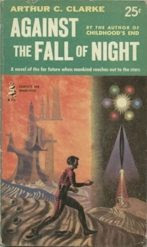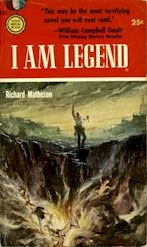 Science fiction lost a legend last week when Sir Arthur C. Clarke passed away at the age of 90. To begin our tribute, the Book of the Week is the 1954 first paperback printing of Sir Arthur's first book, Against the Fall of Night, cover art by Richard Powers.
Science fiction lost a legend last week when Sir Arthur C. Clarke passed away at the age of 90. To begin our tribute, the Book of the Week is the 1954 first paperback printing of Sir Arthur's first book, Against the Fall of Night, cover art by Richard Powers.Set far in the future on an Earth mired in decay, Against the Fall of Night tells of a young man named Alvin, who sets out to recapture past glories. The novel was first published in shorter form in the pulp magazine Startling Stories in 1948. Even though the book was well received when republished in the early 50's, Sir Arthur was dissatisfied with it, and entirely rewrote it as The City and the Stars, which first appeared in 1956. Such is the power of Clarke's imagination that both versions remained in print for many years.
As discussed in a prior BOTW about Childhood's End Arthur C. Clarke is best remembered outside the science fiction genre as the author of 2001: A Space Odyssey, while his most influential book within the genre was Childhood's End. But perhaps his greatest contribution to humanity was originating the concept of placing communications satellites in geosynchronous orbits -- to this day often called "Clarke orbits" in his honor.
An underappreciated aspect of Clarke's career is his outstanding short fiction. You will see the first appearance of my personal favorite Arthur C. Clarke short story next week.


